Preserving Memories of War Captivity: Legacy, Museums and Repositories
April 23, 2024, 2:00 PM - 9:00 PM
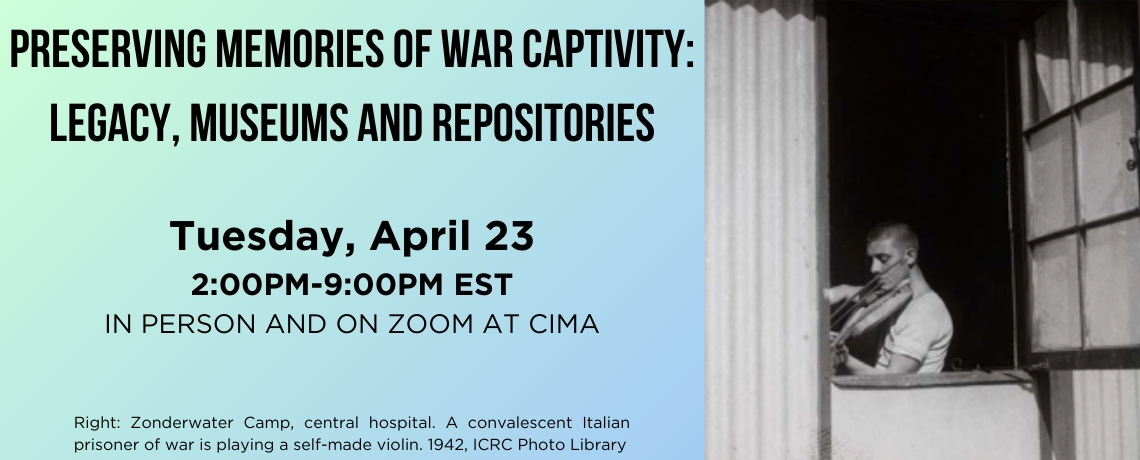
First day, in person and on Zoom at CIMA
Second day, in person and on Zoom at Casa Italiana Zerilli-Marimò – NYU
This event is free and open to the public.
RSVP HERE ON ZOOM AND IN PERSON FOR APRIL 23
To follow this event from home on Zoom, please use this link: https://us06web.zoom.us/j/85723643817
Organizers: Elena Bellina, NYU; Giorgia Alù, University of Sydney
A two-day international conference where archivists, historians, and museum experts will explore their research endeavors. Delving into the intricate tapestry of WWII Italian captivity across Italy, the United Kingdom, the US, and Australia, this event will provide illuminating discussions on preservation, storytelling, and cataloging efforts. Experts will unveil their curated collections, pioneering scholarly projects, and share insights into the curation of special collections, museums, and institutions intertwined with the cultural and material legacies of Italian POWs.
This event is part of a series on “Memory, Memories, and Memorialization of WWII Italian Captivity”, organized by Elena Bellina and Giorgia Alù and co-sponsored by NYU Casa Italiana Zerilli-Marimò, The University of Sydney, The John D. Calandra Institute for Italian American Institute (CUNY), and the Centre for Italian Modern Art in New York. The events aim to investigate how WWII Italian POWs have narrated their long captivity experiences, as well as how these narratives have been recollected and memorialized in Italy, America, Australia, Asia, and Africa.
PROGRAM
ROUNDTABLE 1 – 2:00-4:00pm (EST-NYC)
Preserving Memories of Captivity and Their Legacy: Museums and Archives – Part One
MODERATOR: Nicola Lucchi, Executive Director, Center for Italian Modern Art
SPEAKERS:
Alan R. Perry, Professor of Italian, Gettysburg College, Letterkenny’s Italian POW Trench Art: The Chapel and Bell Tower
Steve Mancini, Professor of Computer and Information Systems, Robert Morris University, On Filming Letterkenny
Summer O’Brian, Curator, Eden Camp Modern History Museum, UK, Collecting Material History of WW2 Captivity in the UK
Emanuele Di Muro, Archivist Archivio dell’Ufficio Storico dello Stato Maggiore dell’Esercito/ Italian Army Historical Office; University of Molise, Italy, Italian POWs in the Italian Army Military Records: The Case of General Guglielmo Nasi
Natalia Cangi, Director, National Diary Archive, Pieve Santo Stefano, Italy, Saverio Tutino’s Project on Collecting War Memories
Emilio Coccia, President, Zonderwater Block Ex POW Association, South Africa, The Italian POWs Legacy in South Africa: the Zonderwater Museum
ROUNTABLE 2 – 4:30-6:30pm (EST-NYC)
Preserving Memories of Captivity and Their Legacy: Digital Humanities Projects
MODERATOR: Yemane Demissié, Professor of Cinema, NYU
SPEAKERS:
Giovanni Pietro Vitali, Associate Professor in Digital Humanities, Université de Versailles Saint Quentin; Associated Researcher, University of Oxford,
Ultime Lettere / Last Letters from the World Wars: Forming Italian Language, Identity and Memory in Texts of Conflict. https://www.ultimelettere.it/LastLetters/people/giovanni-pietro-vitali
Daniel Hutchinson, Associate Professor of History and Chair of the History Department of Belmont Abbey College (NC), German POW Newspaper Archive
http://dhl.bac.edu/pow-newspapers
Stuart Lee, Reader in e-Learning and Digital Libraries; Faculty of English, University of Oxford, Their Finest Hour: Digital Crowdsourcing of WW2 Material
https://theirfinesthour.english.ox.ac.uk/
Adrian Vickers, Professor of Southeast Asian Studies, The University of Sydney
Opening the Multilingual Archive of Australia: OMAA
https://omaa-arts.sydney.edu.au/
Light refreshments will be provided
ROUNDTABLE 3 – 7:00-9:00pm (EST-NYC)
Preserving Memories of Captivity and Their Legacy: Museums and Archives – Part Two
MODERATOR: Stefano Albertini, Director, Casa Italiana Zerilli-Marimò, NYU
SPEAKERS:
Joanne Tapiolas, Founder of Footprints of Italian Prisoners of War, Australia, A Community History Project
https://italianprisonersofwar.com/
Elizabeth Triarico, Manager, Italian Historical Society, Co.As.It, Melbourne, Australia, Preserving and Sharing Stories of Italian Captivity in Australia
https://www.coasit.com.au/italian-historical-society
Elisa Longarato, Founder of Zonderwater Online Project, Italy, On the Zonderwater Block ex-POW Association
http://www.zonderwater.com/en/
Stephanie Longo, Writer of Italian American Regional History, US, Letterkenny, Memories and Community
Alan Perry, Professor of Italian, Gettysburg College, US, Hereford’s Italian POW Material Culture: A Texan Capitello and St. Mary’s Beautification
Warren Stricker, Director of the Research Center, The Panhandle-Plains Historical Museum in Canyon, Texas, US, Captivity and Community on the Texas Plains
Please note: the moderators of this event will be onsite at CIMA, while the speakers will be connecting via Zoom from different countries. We will project the speakers’ live presentations on CIMA’s large screen.
To follow this event on Zoom, please use this link: https://us06web.zoom.us/j/85723643817
Italian Futurism and Bay Area Dada in the 1970s
April 18, 2024, 6:00 PM
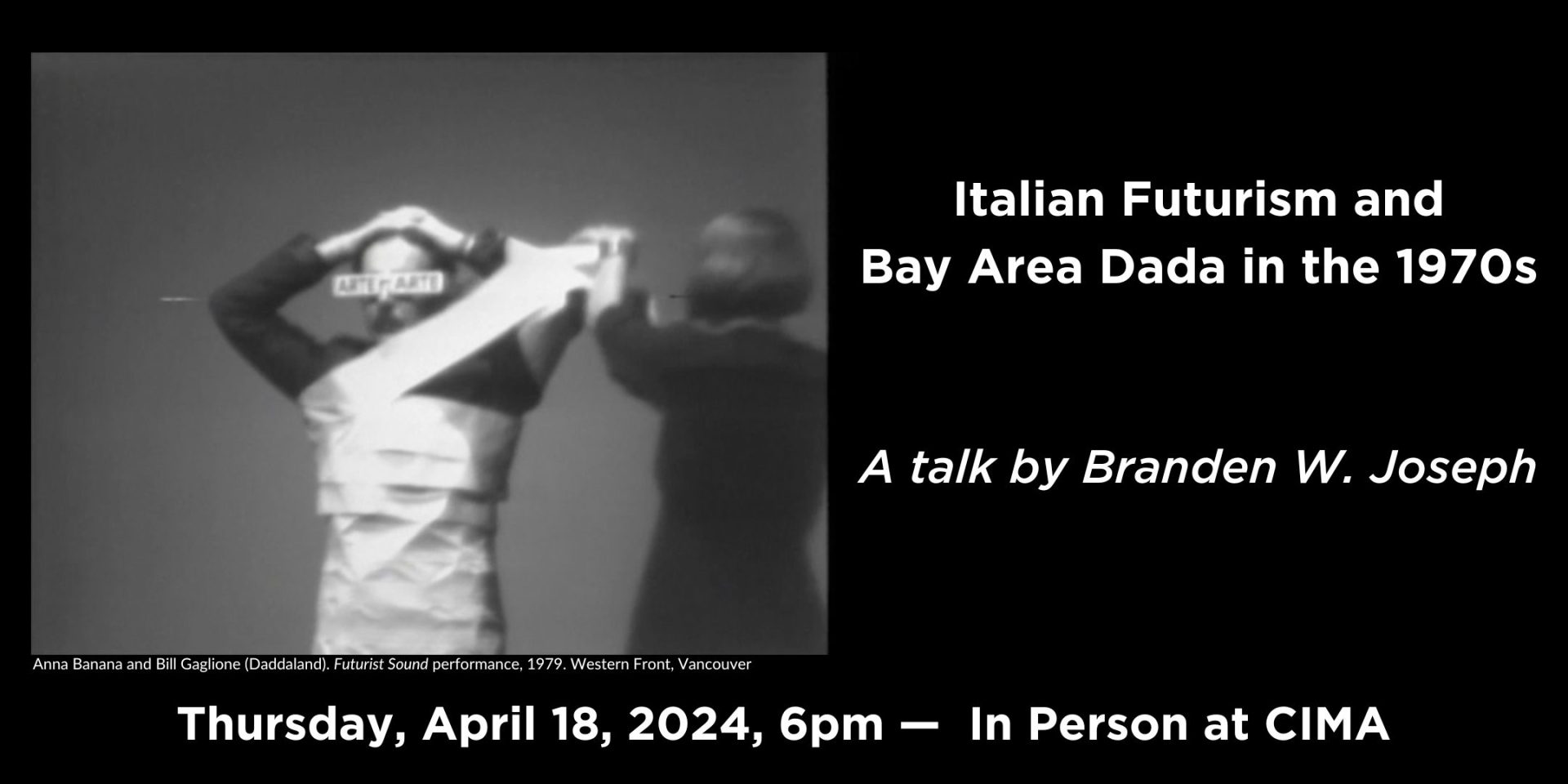
General Admission: $15, Members & Students: FREE
This presentation will discuss the revival and interest in Italian Futurism by a group of important but lesser-known performance and correspondence artists based in San Francisco known as the Bay Area Dadaists. A loose coalition of figures who often went by assumed names—Monte Cazazza, Bill Gaglione (Daddaland), Irene Dogmatic, etc.—their engagement with the historical avant-garde was vectored, in poignant and prescient ways, against both conceptualism and pop art, critiquing artistic commodification and authorship. Although separate, their interest in Futurism and engagement with collage paralleled that of Nanni Balestrini and the Italian Neoavanguardia, while it prefigured and influenced the development of Bay Area punk rock.
Branden W. Joseph is Frank Gallipoli Professor of Modern and Contemporary Art at Columbia University. He is the author of five books and nearly 100 articles on contemporary art, music, and film. He is co-curator of the exhibition Copy Machine Manifestos: Artists Who Make Zines on view at the Brooklyn Museum until March 31, 2024.
Light refreshments will be offered
Multipli Forti: Italian Literary Fiction Festival (3rd edition)
April 12, 2024, 10:30 AM - 12:30 PM
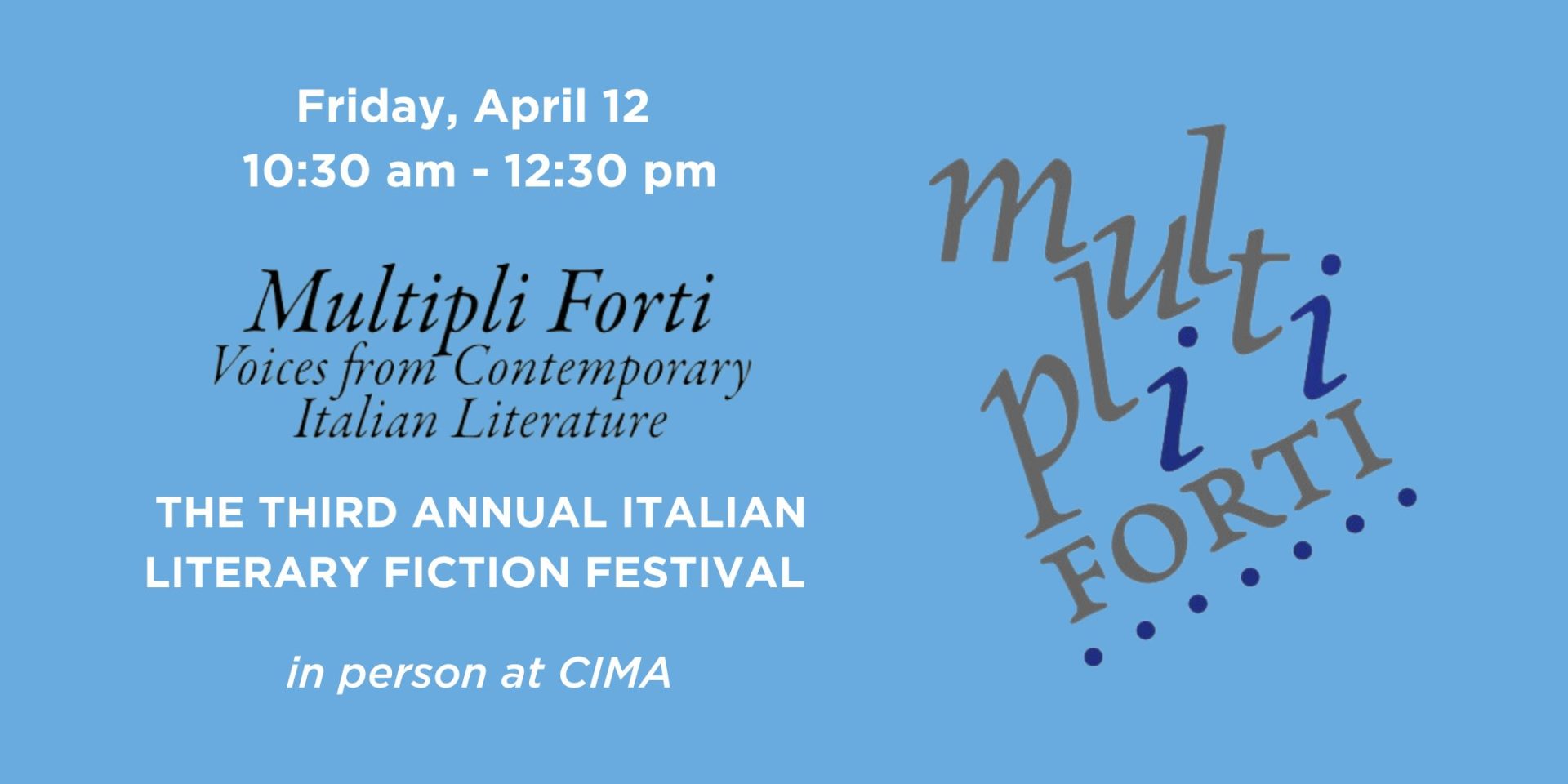
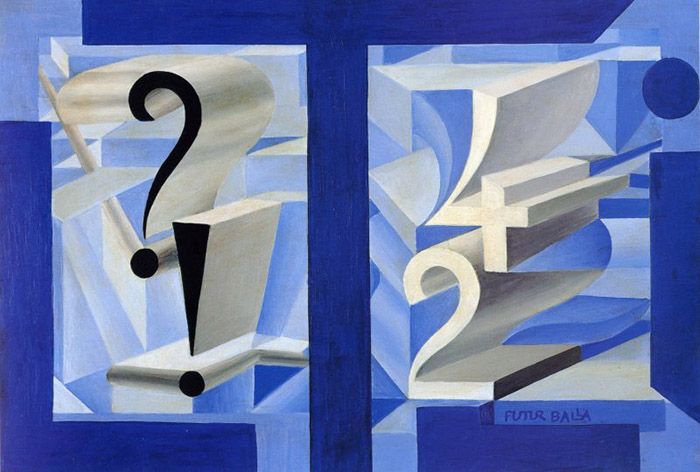
General admission: Free
RESERVE YOUR FREE TICKETS HERE!
CIMA is proud to host the morning of the last day of the third annual Italian Literary Fiction Festival.
The Italian Cultural Institute in New York
in collaboration with
FUIS (Italian Unitary Writers’ Federation) — THE BRIDGE Prize – Casa Italiana Zerilli-Marimò New York University – CUNY Hunter College – (CIMA) The Center for Italian Modern Art) — RIZZOLI Bookstore
presents
MULTIPLI FORTI
Voices from Contemporary Italian Literature
ITALIAN LITERARY FICTION FESTIVAL – 3rd EDITION
NEW YORK CITY
10 – 11 – 12 April, 2024
ITALIAN CULTURAL INSTITUTE — CUNY Hunter College — CASA ITALIANA ZERILLI MARIMÒ NYU — CIMA — RIZZOLI Bookstore
Multipli Forti is a transatlantic window on major literary trends of Italian fiction, with the participation of authors, editors, translators and readers.
Participants:
Francesca Archibugi, Annalena Benini, Matteo B. Bianchi, Giulia Calenda, Giulia Caminito, Giancarlo De Cataldo, Viola Di Grado, Alain Elkann, Emily Greenhouse, Isabella Hammad, Rea Hederman, Lorenza Honorati, Daniele Mencarelli, Andrea Molesini, Carmen Pellegrino, Tommaso Pincio, Saif Raja, Loretta Santini per Ada D’Adamo, Nadeesha Uyangoda, Alice Urciolo, Marina Valensise, Massimo Vallerani, Carlo Vecce.
To view the full festival program, click here.
PROGRAM at CIMA on Friday, APRIL 12
10:00 am — Doors Open
Visit to CIMA’s current exhibition Nanni Balestrini: Art as Political Action – One Thousand and One Voices, curated by Marco Scotini
10:30 am – 12:30 pm
Tommaso Pincio – Carmen Pellegrino – Matteo B. Bianchi – Michael Moore
Chairs: Isabella Livorni – Alessia Valfredini
General admission: Free
Investigation of a Citizen Above Suspicion: A Film Screening at CIMA
April 11, 2024, 7:00 PM
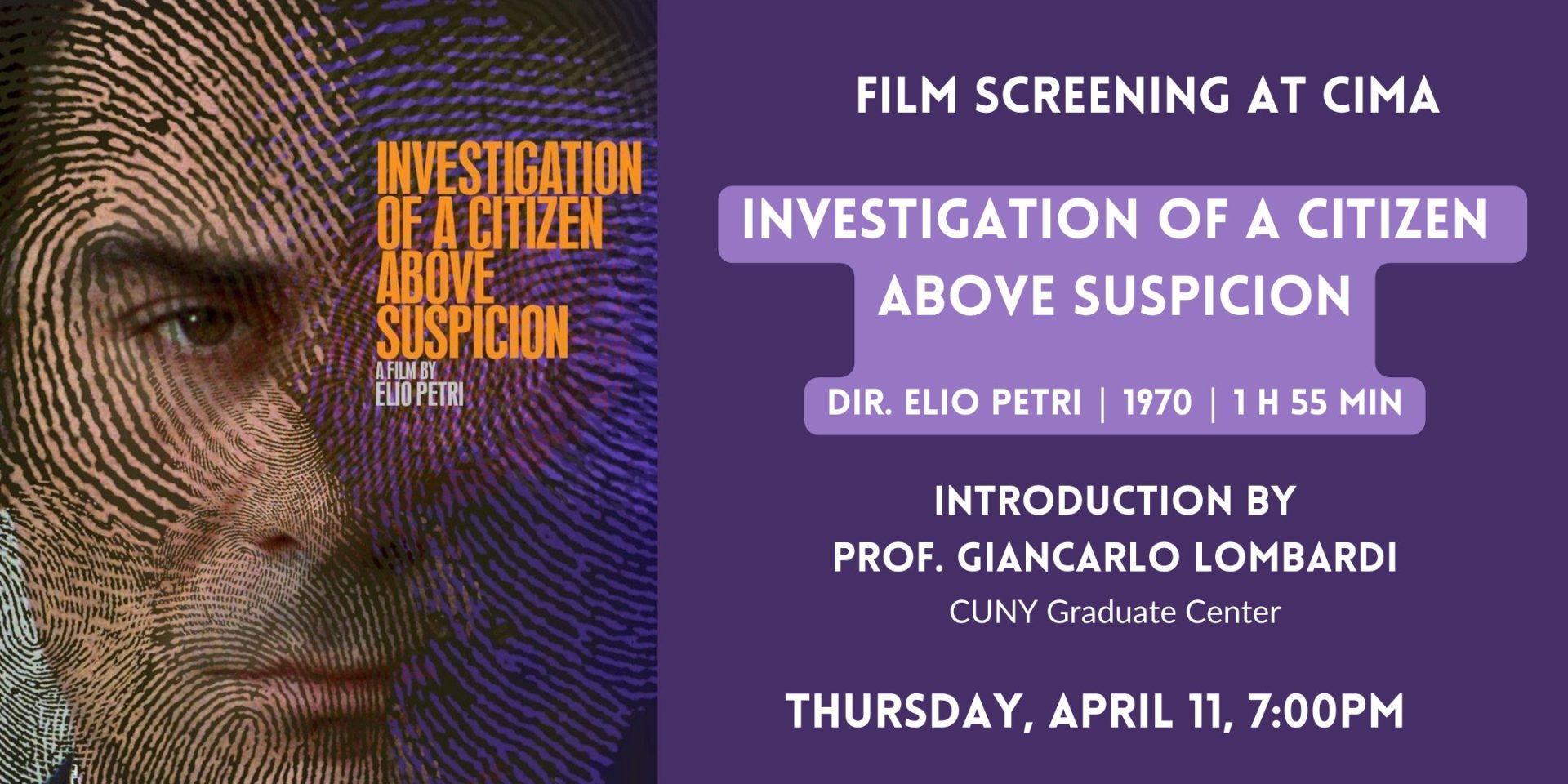 General Admission: $15, Members & Students: FREE
General Admission: $15, Members & Students: FREE
In Italian with English subtitles (1 hr and 55 min)
In conjunction with CIMA’s current exhibition Nanni Balestrini: Art as Political Action – One Thousand and One Voices, we are hosting an in-person screening of Investigation of a Citizen Above Suspicion (1970), the Oscar-winning film directed by Elio Petri, starring Gian Maria Volonté and Florinda Bolkan, with music by Ennio Morricone.
A suspense melodrama with the moral concerns of angry satire […] — The New York Times
Synopsis (via Wikipedia): A recently promoted police inspector kills his mistress, and then covers up his involvement in the crime. He insinuates himself into the investigation, planting clues to steer his subordinate officers toward a series of other suspects, including the woman’s gay husband and a student leftist radical. He then exonerates the other suspects and leads the investigators toward himself to prove that he is “above suspicion” and can get away with anything, even while being investigated.
The film will be introduced by Giancarlo Lombardi, Professor of Comparative Literature at CUNY Graduate Center. Prof. Lombardi came to the United States in 1990, and obtained a Ph.D. in Romance Studies at Cornell University, where he pursued his interests in 19th and 20th century Italian, French, English, and American literature, literary theory, film studies, and cultural studies.
Persisting Matters: Film Screening and Discussion
April 10, 2024, 6:00 PM - 7:30 PM
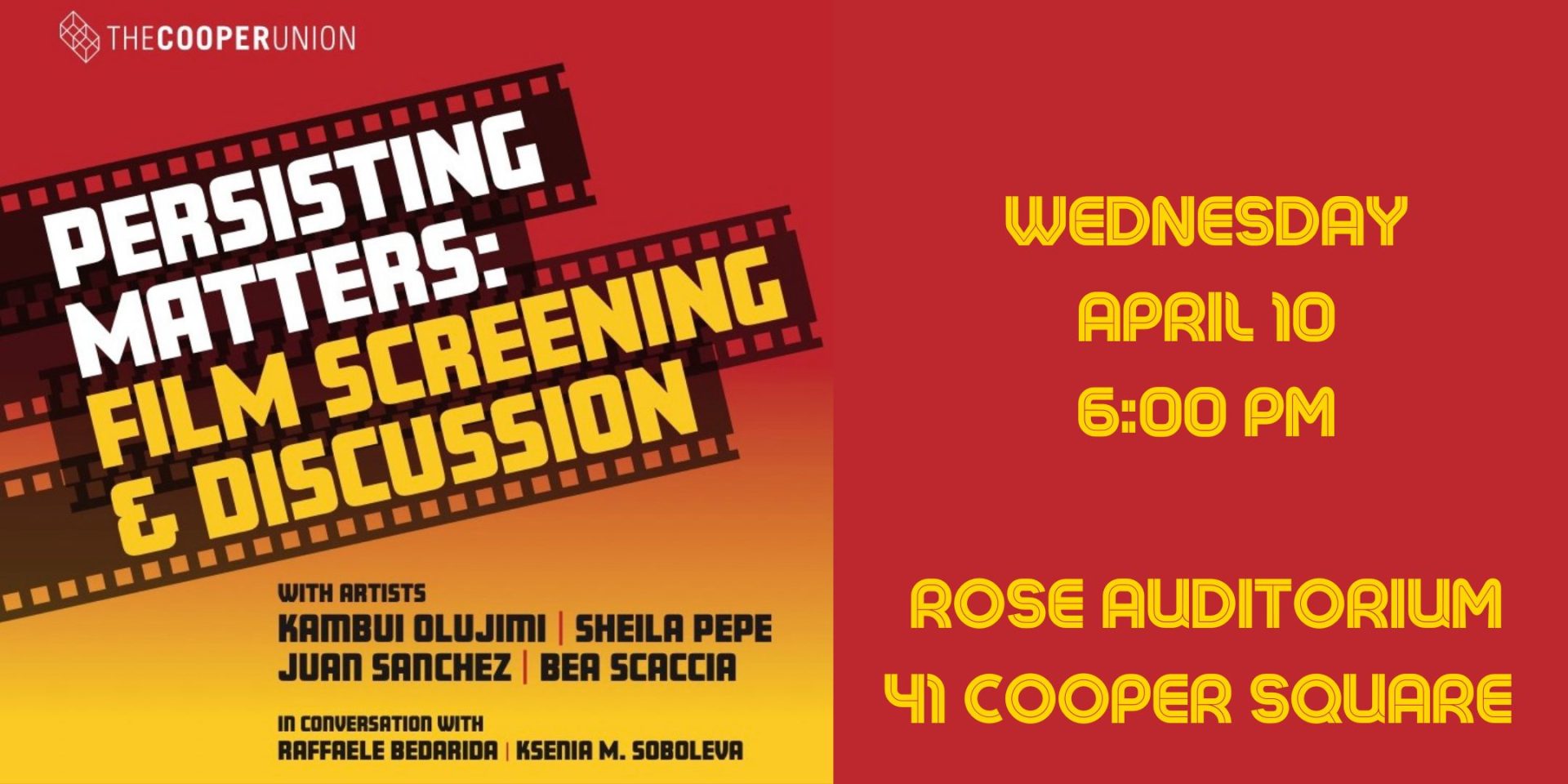
The Cooper Union and the Center for Italian Modern Art (CIMA) host a screening and discussion around five short documentaries developed by CIMA that showcase the variety of approaches that contemporary artists embrace in order to address pressing questions related to identity, social issues, history, and the active role of art in public discourse.
The first documentary presents the exhibition on Jewish Italian artist Corrado Cagli (1910-1976), curated by Cooper Union Professor of Art History Raffaele Bedarida, which served as the background for a project with contemporary artists Leslie Hewitt, Kambui Olujimi, Sheila Pepe, Juan Sanchez, and Bea Scaccia. The project was developed with a grant from the Andy Warhol Foundation for the Visual Arts. The following four shorts feature interviews with each of the artists recorded in their respective studios over the course of Fall 2023 about their practice, covering various questions related to art, society, and community.
Screenings will be accompanied by conversation among the artists and art historians Raffaele Bedarida and Dr. Ksenia M. Soboleva.
All documentaries are filmed by Awen Films.
A century of Visual Writing in Italy: Luigi Ballerini in Conversation
April 04, 2024, 6:00 PM
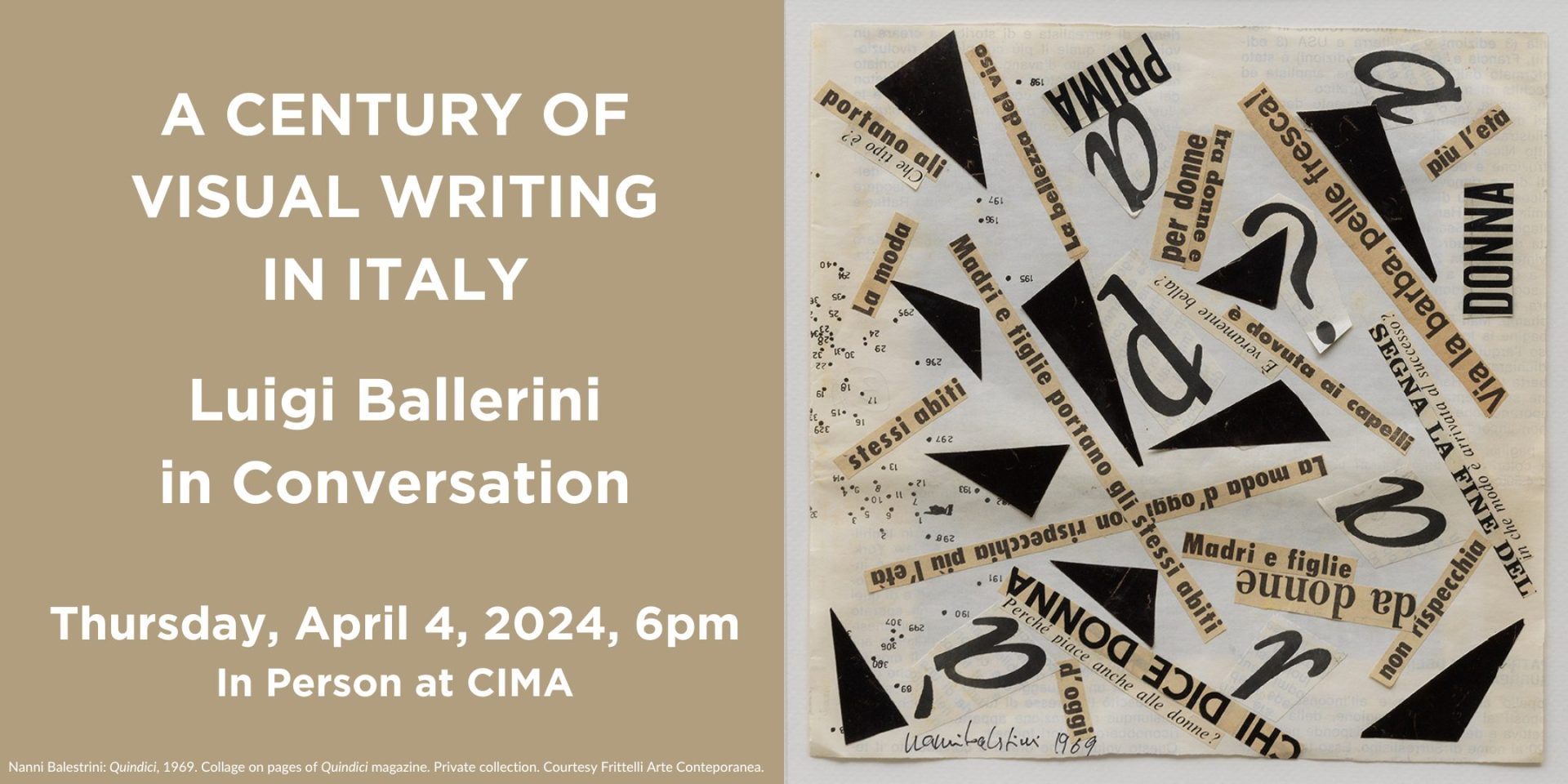
General Admission: $15, Members & Students: FREE
This conversation with leading Italian scholar and poet Luigi Ballerini is a unique opportunity to learn about the evolution, significance, and impact of visual writing in Italy as part of a global artistic movement. From the historical avant-gardes of the early twentieth century to the neo-avant-garde experimental practices in postwar Italy, Professor Ballerini will discuss the continuities and differences among these artistic expressions and the cross-pollination between visual arts and literature. The conversation between Prof. Ballerini and CIMA fellows Anna Szirmai and Francesca Zambon will explore the vast intercultural experiences that shaped the Italian art scene during and after the Years of Lead.
Luigi Ballerini (UCLA, Emeritus) is an Italian writer, poet, translator, and literary critic. Born in Milan, Professor Ballerini studied in Milan, London and Bologna. He taught at the Italian Department at the University of California, Los Angeles, at City College and the Graduate Center of the City University of New York, as well as at New York University, where he became the director of Italian Studies in 1976, and first director of the University’s Casa Italiana in 1990. He now lives between New York and Milan.
In 1963, Prof. Ballerini began working on the editorial staff of Rizzoli, sending to print the Italian translation of Foucault’s Madness and Civilization. In 1965, he moved to Rome, where he met neo-experimental artists and poets such as Adriano Spatola, Giulia Niccolai, Nanni Cagnone, Eliseo Mattiacci, Magdalo Mussio, Emilio Villa, Alfredo Giuliani, Giovanna Sandri and, in particular, Elio Pagliarani, with whom he became a collaborator.
Professor Ballerini moved to the United States in 1969, to teach Modern and Contemporary Italian Literature at University of California, Los Angeles. By 1971, he moved to New York, where he began teaching for the City University of New York and later for New York University. He returned to UCLA in 1992.
In New York, Prof. Ballerini has collaborated with both visual artists and poets. In 1973, he organized the exhibition Italian Visual Poetry from 1912 to 1972 at the Finch College Museum. In 1991, he organized the meeting of Italian and American poets The Disappearing Pheasant. His publications include major works in the field of literary criticism (La piramide capovolta, 4 per Pagliarani); translations (of, among others, Gertrude Stein, Lionel Abel, Leslie Fielder, Herman Melville, Benjamin Franklin, James Baldwin, Henry James, Charles Olson, Amiri Baraka); poetry collections, such as Il terzo gode (1994), Che figurato muore (1988), Shakespeherian rugs (1996), Uno monta la luna (2001), and Cefalonia ’43 (published by Mondadori in 2005 and awarded with the Brancati and Lorenzo Montano prize, and then reissued by Marsilio in 2013); the plaquette Uscita senza strada ovvero come sbrinare una bandiera rossa (2000), the book Se il tempo è matto (2010) and most recently the book of poems Divieto di sosta, published by Nino Aragno Editore in 2021.
Ballerini edited various works, including Marinetti’s Gli indomabili and Mafarka il futurista, and Melville’s Benito Cereno. He published the anthologies, Shearsmen of Sorts: Italian Poetry 1975-1993 (1992), The Promised Land (1999), and Those Who Look Like Flies from Afar (2013). His 1991 volume Che oror l’orient, a collection of bilingual poems in Italian and Milanese dialect, was awarded the Feronia Prize for poetry.
After collaborating with American publishing houses, in 2000 he founded Agincourt Press, which publishes experimental poetry, psychoanalysis, philosophy and literature. He is also known as a culinary historian, and since 2012 he has created the series of meetings “Latte e Linguaggio” (Milk and Language), which took place at the Chiesa Rossa public library in Milan. He is Founder and General Editor of the Lorenzo Da Ponte Italian Library, a series published by the University of Toronto Press.
Light refreshments will be offered
Computing the Unexpected: Nanni Balestrini’s “Tape Mark I”
March 14, 2024, 6:00 PM
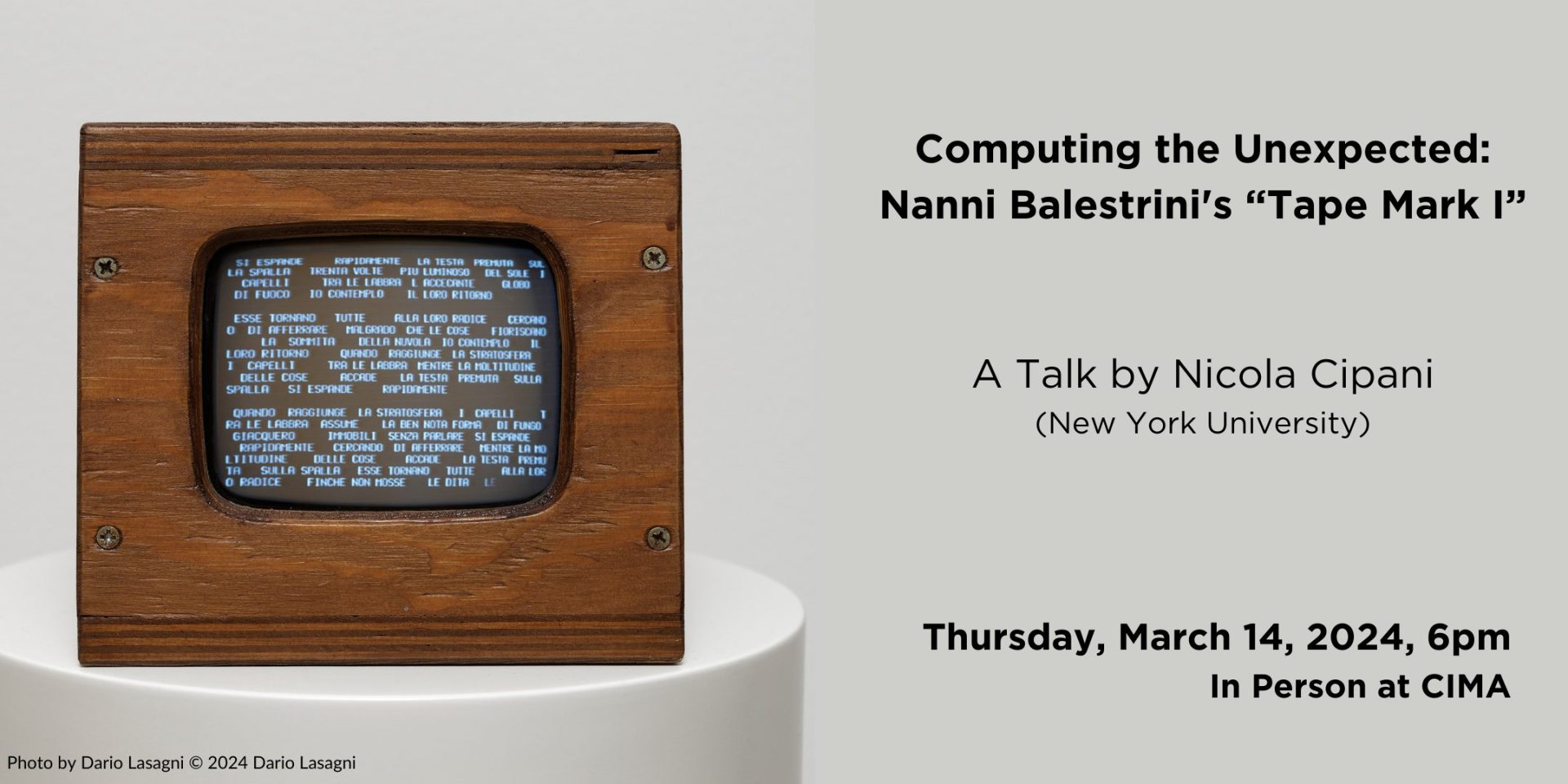
General Admission: $15, Members & Students: FREE
This presentation provides context for Nanni Balestrini’s computer-assisted poem “Tape Mark I”, aiming for a critical reassessment of two pivotal facets in his pioneering experiment: the materialistic approach to language and the emergence of an artificial agent.
Nicola Cipani earned his PhD from the Humboldt University, Berlin, with a thesis on Giordano Bruno. He is faculty in NYU’s Italian Studies department, where he teaches courses that focus on the intersection between verbal and visual languages and on literary machines. He has translated and commented works of the Austrian avant-garde writer and philosopher Oswald Wiener and is currently curating an Italian edition of the correspondence between Goethe and Schopenhauer on color theory.
Light refreshments will be offered
“A new revolutionary art”: Balestrini and the Great Revolt of the Long 1960s
March 12, 2024, 6:00 PM
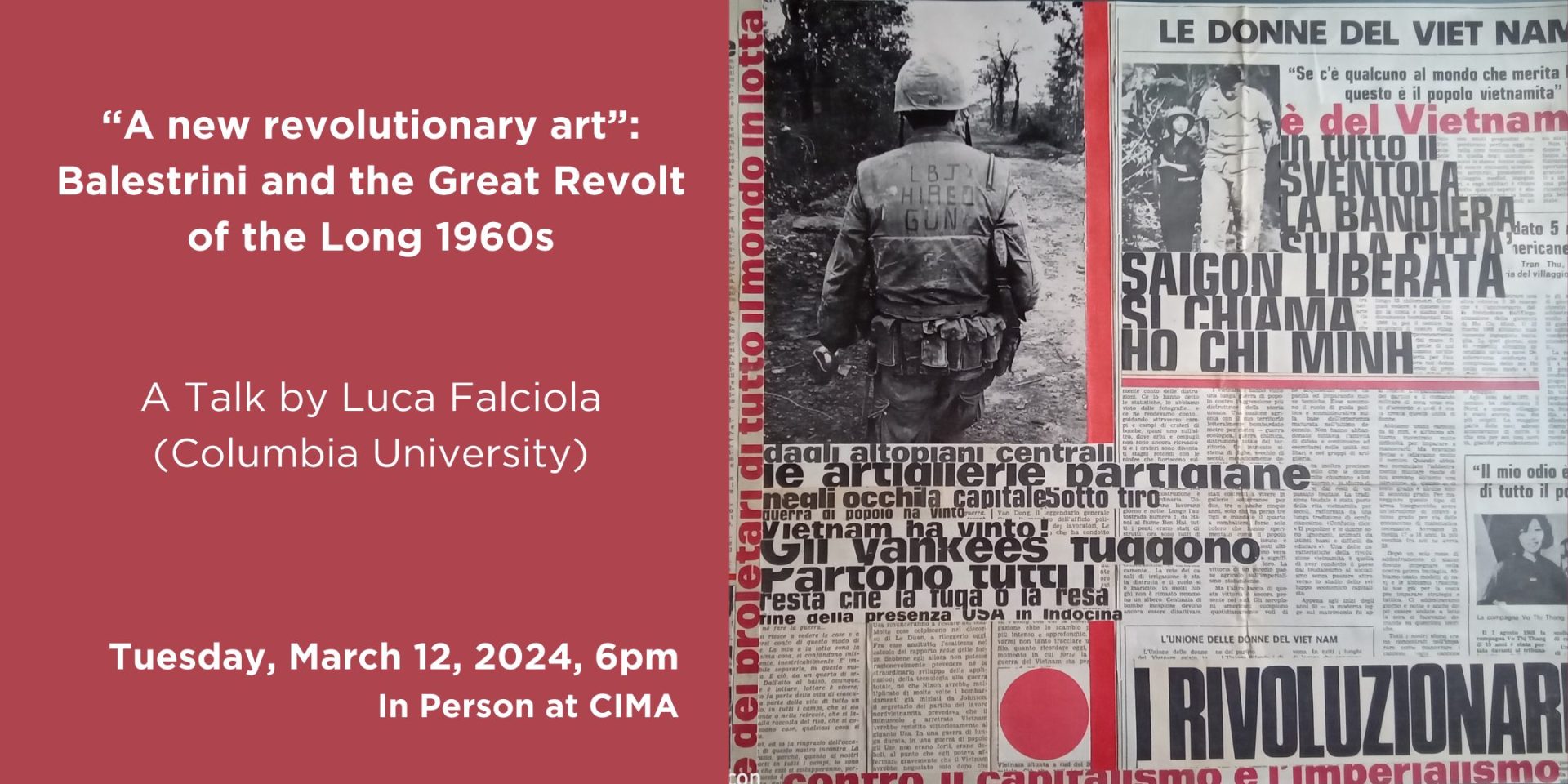
General Admission: $15, Members & Students: FREE
This presentation aims to illuminate the social, political, and cultural movements that nurtured Balestrini’s fervent commitment to rebellion. Examining the contradictions of the Neoavanguardia, the contagious enthusiasm for 1968, the novelty of workerist ideas, and the magnetism of Potere Operaio, the talk endeavors to make sense of Balestrini’s call for a new art that is “crafted by the masses and for the masses.”
Luca Falciola is a Lecturer in History at Columbia University. His research focuses on social movements, political radicalism, and violence. His publications include the award-winning Il movimento del 1977 in Italia (Carocci, 2015).
Light refreshments will be offered
WATCH THE VIDEO OF THE EVENT
Members Opening Reception: “Nanni Balestrini: Art as Political Action – One Thousand and One Voices”
February 22, 2024, 6:00 PM
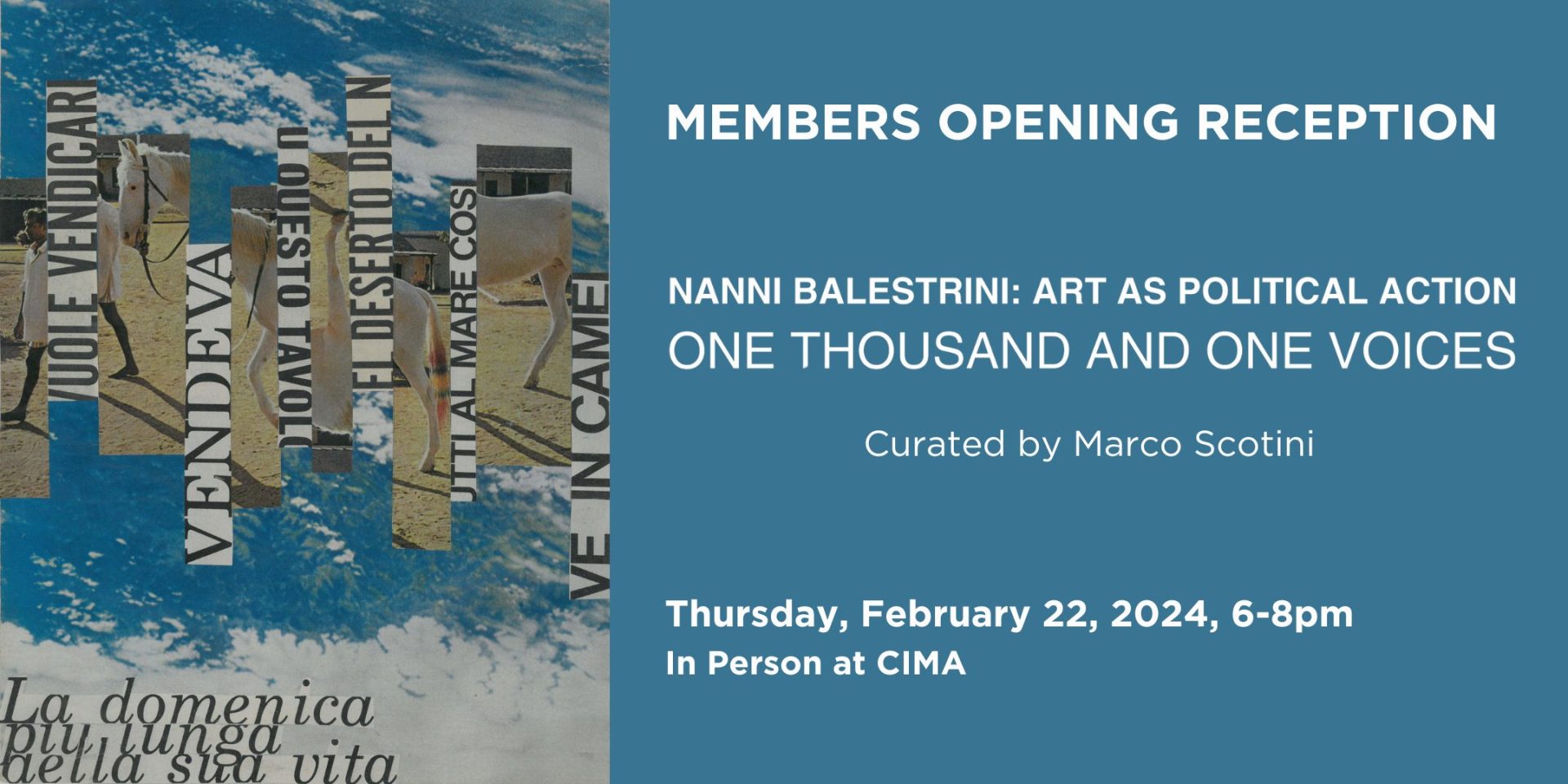 CIMA Members at any level are invited to join us for the opening reception of our new exhibition, Nanni Balestrini: Art as Political Action – One Thousand and One Voices. This will be an opportunity to view the exhibition before it opens to the public and to meet curator Marco Scotini.
CIMA Members at any level are invited to join us for the opening reception of our new exhibition, Nanni Balestrini: Art as Political Action – One Thousand and One Voices. This will be an opportunity to view the exhibition before it opens to the public and to meet curator Marco Scotini.
Join us for light refreshments.
NOT A MEMBER? JOIN TODAY!
Please RSVP to lombardo@italianmodernart.org
Corrado Cagli & Music: A Concert at Lincoln Center
January 30, 2024, 7:30 PM - 9:00 PM
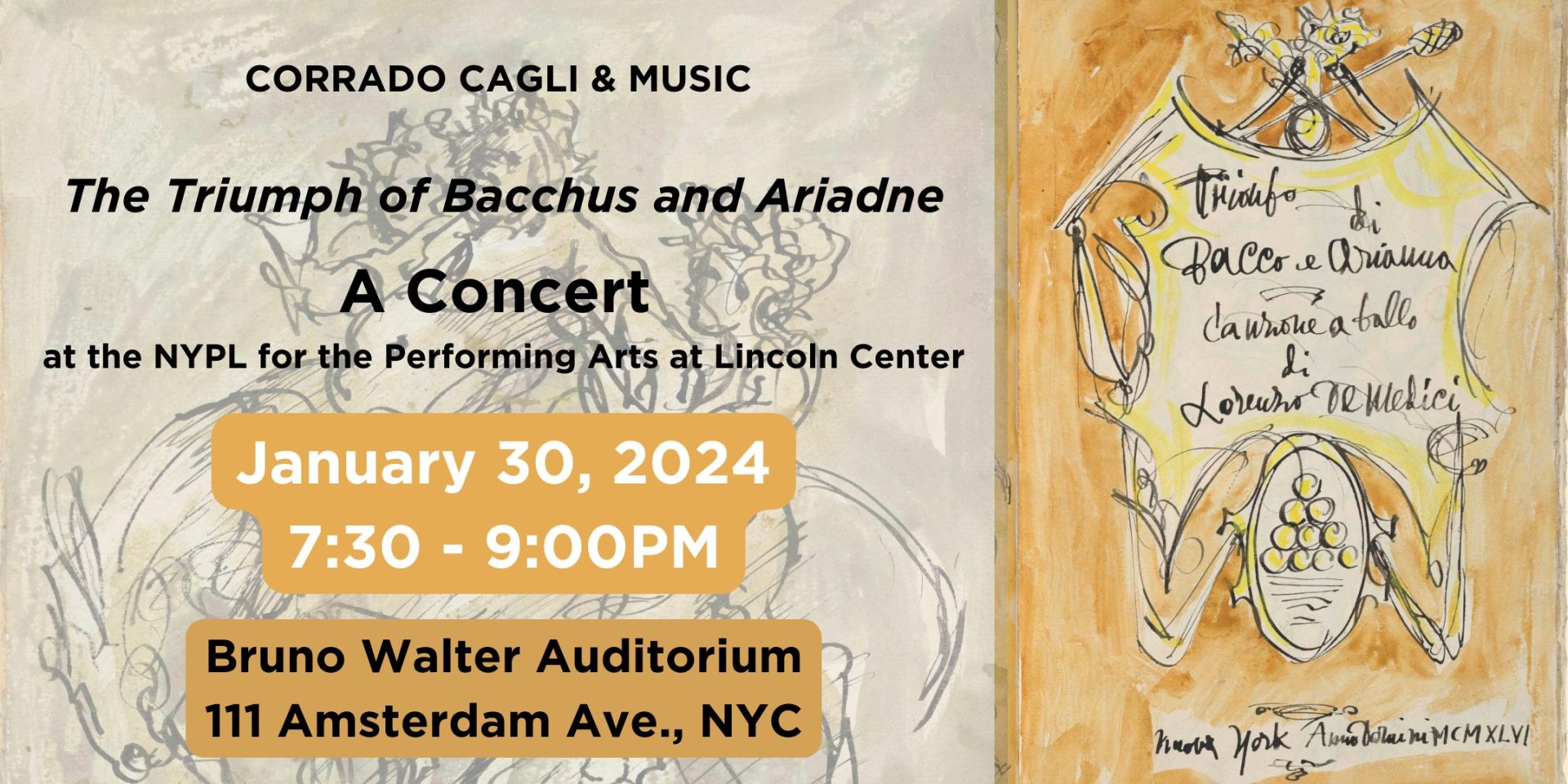
General Admission: FREE
Join us for a music concert presented by the Primo Levi Center, Casa Italiana Zerilli Marimò and CIMA, on the occasion of the International Holocaust Remembrance Day.
The score of The Triumph of Bacchus and Ariadne will be presented in its entirety for the first time since the first performance by George Balanchine’s Ballet Society (today’s New York City Ballet) in 1948.
Cantori New York directed by Mark Shapiro will perform Vittorio Rieti’s music for The Triumph of Bacchus and Ariadne, a Renaissance poem by Lorenzo de’ Medici whose refrain “del doman non v’è certezza” (future holds no certainty) resonated with the experience of displacement in the immediate aftermath of World War II.
Behind the project was the painter, set designer and cultural organizer, Corrado Cagli. Echoed in this performance are his reckoning with his life in fascist Italy, the catastrophe of the war, and the mass murder of the Jews. Cagli’s first exhibition in New York since 1937, Transatlantic Bridges: Corrado Cagli, 1938-1948 is on view at CIMA through January 27.
The exhibition’s curator Raffaele Bedarida will give a brief overview on the history of the piece and Cagli’s work.
The Triumph of Bacchus and Ariadne
Concert for piano and choir
after the poem Del doman non v’è certezza (Tomorrow Holds No Certainty)
by Lorenzo Il Magnifico (1449-1492)
Music by Vittorio Rieti (1898-1994)
Concept and design by Corrado Cagli (1910-1976)
for George Balanchine’s Ballet Society (1948)
Featuring Cantori New York:
Mark Shapiro, Artistic Director
Shelén Hughes, soprano
Matthew Anchel, bass
Baron Fenwick, piano
Followed by a presentation by Raffaele Bedarida,
author of Corrado Cagli: Transatlantic Bridges 1938-1948, CPL Editions 2023 and curator of Transatlantic Bridges: Corrado Cagli, 1938-1948, the exhibition on view at CIMA through January 27, 2024
Total duration: 80 min.
This event is part of a series of programs organized in connection with the International Holocaust Remembrance Day. Please see the full program of events at this link or see the PDF version.
Public programming at CIMA is made possible with the generous support of Tiro a Segno Foundation.

